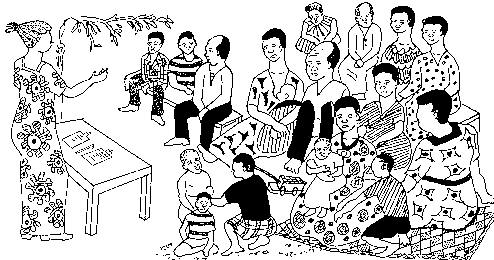Tweet
Translations:
'العربية / al-ʿarabīyah
Bahasa Indonesia
বাংলা / Baṅla
Català
中文 / Zhōngwén
English
Español
Filipino/Tagalog
Français
Galego
Ελληνικά / Elliniká
हिन्दी / hindī
Italiano
日本語 / Nihongo
Kiswahili
Polszczyzna
Português
Română
Српски / Srpski
Tiếng Việt
Türkçe
اردو / Urdu
Other formats:
TextOther Pages:
Modules
Site Map
Key Words
Contact
Utility Documents
Useful Links
COMMUNITY EMPOWERMENT
How do we assist communities to become stronger?
by Phil Bartle, PhD
Introduction to the Module (Hub)
Documents Included in this Empowerment Module
- Definition of Community
- Community Empowerment, making neighbourhoods stronger
- Factors of Poverty; The Big Five, attack causes, not symptoms
- People Development, Not Hardware, human scale, not technology;
- Revealing Hidden Resources, sustainable development, avoiding charity
- Twelve Lessons, learned by Community Development of Habitat;
- Culture and Social Animation, a taste of social science theory for the field worker;
- Preserving Culture, No. Strengthen it instead;
- Politics and Mobilization Training, roles of politics in community empowerment;
- Know when to fold 'em, sometimes it is necessary to walk away;
- Eight Elements of The Empowerment Methodology;
- Kindness Kills help can be unfortunate;
- Human factor and community empowerment ;
- Go to the People, poem by Lao Tsu.
- Story One, she could not walk away
- Story Two, he was not impressed
- Story Three, they wanted to alleviate poverty
- Gaining Community Ownership, by Ben Flemming;
- PAPA, by Kamal Phuyal.
The virtue of adversity is fortitude.
Francis Bacon
Empowerment Methodology:
The training material on these pages is aimed at attacking poverty on two levels, the individual level, where organizing a credit organization and training in micro-enterprise is featured, and at the community level, where mobilization and management training are aimed at empowering low income communities.
Since this training material is aimed at the community field worker, it minimizes history and theory, and emphasizes skills, techniques and programmes. For those who recognize it, the theory behind all the skills and techniques on these pages, is sociological.
The successful community worker can not do the best job, however, unless she or he is familiar with some of the basic principles that lie behind the offering of skills or describing the programmes to be set up.
Two modules are therefor presented here to simplify and describe those basic principles, without getting too academic and theoretical.
The attack on poverty on the individual front, leading to forming a credit organization and offering micro enterprise training, is the focus of the module, Introduction to Income Generation Principles. The attack on poverty at the communal level is the focus of this module.
It is built up of several important principles:
- while assistance is offered, it is not charity assistance which promotes dependency and weakness, but assistance and training that promotes self reliance and increased capacity;
- organisms become stronger by exercising, struggling, and facing adversity, and empowerment methodology incorporates this principle;
- hands on participation by the recipients is essential for their increase in capacity; and
- we aim at the participants taking full control, full decision making, and . full responsibility for the actions which will lead to their increased strength.
The stage for this module is set by Community Empowerment, (making neighbourhoods stronger)
Among the web pages in this module, Factors of Poverty; The Big Five, urges that the attack should be on the causes, not symptoms, of poverty, if it is to be eliminated and not merely temporarily alleviated.
The People Development, Not Hardware handout, argues that development, and development assistance should be "human scale," not large scale technology development, which has been shown to not lead to sustainable development.
The paper, Revealing Hidden Resources, examines the principles leading to sustainable development, by avoiding charity, by identifying and using local resources.
The Culture and Social Animation paper is a taste of social science theory for the field worker. See also "Community" and "What is Community?"
The paper, Preserving Culture, objects to the myth of the "good ol' days," and states that it is better to strengthen culture rather than to protect (weaken) and preserve it.
The guest paper by Ben Fleming examines the need for Gaining Community Ownership in the mobilization process.
The guest paper by Kamal Phuyal, Participatory Appreciative Planning Approach, PAPA, shares some practical experiences from his work in Nepal.
The Go to the People poem by Lao Tsu is a call for participation, involvement and respect for the beneficiaries of development assistance.
You are also invited to look at Introduction to Income Generation Principles, for related and complementary principles of empowerment.
––»«––
Community Gathering; Raising Awareness:
 |